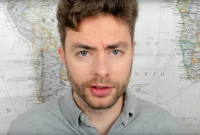Support strong Canadian climate journalism for 2025
Prime Minister Justin Trudeau touched down in Paris on Wednesday to sign a call to action that aims to clamp down on online extremism in the aftermath of the livestreamed shootings that killed 51 people in New Zealand in March.
Trudeau's first engagement was at Notre Dame Cathedral, where he offered Canadian lumber and steel to help with the cathedral's reconstruction.
Later in the afternoon, Trudeau travelled to the Elysée Palace for a summit co-hosted by French Prime Minister Emmanuel Macron and New Zealand Prime Minister Jacinda Ardern.
They joined other political leaders from Europe, Africa and the Middle East and senior officials from Facebook, Google, Twitter and other technology companies for a joint "call to action" that offers strategies to eliminate online terrorist material.
The non-binding pledge at the heart of the summit has been named the 'Christchurch Call.' It is being spearheaded by Prime Minister Ardern and comes exactly two months after 51 people were murdered at two mosques in New Zealand in a terror attack livestreamed on social media. The video of the attack and the alleged gunman’s hate-filled manifesto were circulated widely online. One and a half million copies of the video were subsequently removed from Facebook.
Prime Minister Ardern wrote that she saw the video herself, in a New York Times op-ed published on May 11 that talked about the need to end terrorist and violent extremist content online.
“Social media connects people. And so, we must ensure that in our attempts to prevent harm that we do not compromise the integral pillar of society that is freedom of expression. That right does not include the freedom to broadcast mass murder,” she wrote.
“And so, New Zealand will present a call to action in the name of Christchurch, asking both nations and private corporations to make changes to prevent the posting of terrorist content online, to ensure its efficient and fast removal and to prevent the use of live-streaming as a tool for broadcasting terrorist attacks. We also hope to see more investment in research into technology that can help address these issues.”
British Prime Minister Theresa May, European Union President Jean-Claude Juncker and Irish Prime Minister Leo Varadker all attended, as did senior operatives from tech giants Microsoft, Facebook, Twitter, and Google.
Notable non-attendees are US President Donald Trump and Facebok CEO Mark Zuckerberg.
The summit is being held alongside a G7 meeting of digital ministers attended by Minster of Innovation, Science and Economic Development Navdeep Bains. It also coincides with the “Tech for Good” conference being attended by 80 tech companies in Paris.
Trudeau tours Notre Dame
Shortly after landing in France, Prime Minister Trudeau went on a tour of Notre Dame Cathedral accompanied by the cathedral's rector, Patrick Chauvet, and French Culture Minister Franck Riester.
The Prime Minister said that Canada would support France in helping rebuild the 12th century cathedral, which was partially destroyed by fire last month. "This is truly a piece not just of French history, but of world history that needs to be preserved and we will be there to be part of it," he said.
No Zuckerberg or Sandberg
Facebook's two most senior operatives, Mark Zuckerberg and chief operating officer Sheryl Sandberg, are missing the summit, while United States President Donald Trump was another notable absentee. His administration did not reply to multiple emails from National Observer on why he would not attend.
Nick Clegg, former British deputy prime minister and now Facebook’s chief of global affairs, represented the social media giant at the summit along with chief executive of Twitter Jack Dorsey, Wikipedia founder Jimmy Wales and president of Microsoft Brad Smith.
On Tuesday, Facebook tightened its rules on its live video service, banning users for period of time after the first violation of company policy anywhere on the platform. When questioned why these users wouldn’t be banned from Facebook altogether, a spokesperson from the company told National Observer that accounts that break community standards were already liable to account restrictions of a varying scale.
The move comes on the heels of Facebook’s ban of white nationalism and white separatism. The company said March 27 it was adding those to an internal blacklist it calls “Dangerous Individuals and Organizations."
The current regulatory landscape
Given the Christchurch Call's recommendations are non-binding, it is unclear at this stage how faithfully governmental and private signatories will follow them.
Some countries have introduced online hate legislation this year already.
In Australia, websites and social medias that fail to remove violent videos are now liable for fines of up to A$10.5 million or 10 per cent of annual profit.
In Germany, a law that came into effect on January 1 makes online companies liable for fines of up to €50 million for failing to remove digital hate speech within 24 hours.
In the UK, the government published a white paper last month which proposes a new regulator that would be responsible for setting and enforcing rules prohibiting speech that is illegal or social damaging.
On April 5, Canada’s public safety minister, Ralph Goodale, urged social media platforms “to redouble their efforts to combat the social harms” relating to violent extremist content.






Comments